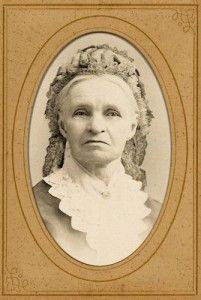Today in the Atlanta Campaign Union forces cross Peach Tree Creek (or Peachtree Creek) and are attacked by Confederate forces. In the evenly-matched Battle of Peachtree Creek, the Union prevails due to confusion and hesitation on the part of the Confederates in attacking the Federals at their most vulnerable.
The Union victory places the Federals closer to the city of Atlanta.
Northward, Edward C. Ambler of Connecticut is an abolitionist Baptist minister who is currently serving as chaplain of the 67th Pennsylvania Regiment. Ambler’s wife, Almira, is no shrinking violet herself. Upon her death in 1891, her obituary in the Danbury Evening News recalls that “Mrs. Ambler was always expected to say something.”
Among the earliest of Northern women to volunteer as a nurse for the Relief Corps of the Grand Army of the Republic (GAR), Almira Ambler writes a letter to the editor of the The Jeffersonian that is published this day. The missive offers unveiled criticism of Northern treatment of wounded Union soldiers.
Mr. Editor – Will you or some of your correspondents please tell why a wounded man cannot be admitted into a sleeping car?
I was procuring my ticket at the depot in Washington, on the 28th of June, when a gentleman stepped up and procured two tickets for, I think, New York. After paying for them he said he also wished to secure two berths in the sleeping car, – one for himself, and the other for his son, who was badly wounded. The agent immediately said: “He cannot be admitted. They do not allow any wounded men in the sleeping car.” The father said, “he must have it.” The agent replied, “You cannot, for I have no authority to give it to you.” “But,” said the father, “my son is badly wounded and I must have a car where he can lie down.” “Well,” said the agent, “you had better see the conductor.” The grieved father turned away, probably to see if he could have the privilege of taking a noble, self-denying son home on the sleeping car of one of our public railroads – I turned in sadness from the office to ask myself this question. Is it true or am I dreaming?
When I was in Philadelphia in May last I saw, and helped dress, the wounds of hundreds on their way from Washington to New York who had traveled all that distance sitting on benches, without even backs to lean against. Is there no remedy for this? Are the resources of our once rich country departed?
If not, I hope some way will soon be devised to make the homeward journey of the defenders of our firesides more comfortable. It can, and should be done.
Mr. Editor, I know that by thus writing I shall incur the displeasure of those that control these things, but if I can make the journey home of our wounded soldiers a little easier, I can well afford to bear it all.
With many wishes for your success in your noble work, I am respected sir, your co-laborer in the Hospital.
Almira Ambler
Annapolis, July 4, 1864
Sources: Battle of Peachtree Creek (link) and (link); Robert D. Jenkins, Sr., The Battle of Peach Tree Creek: Hood’s First Sortie, July 20, 1864, Macon, Ga: Mercer University Press, 2014 (link); Almira Ambler letter, The Jeffersonian, July 20, 1864, noted in Diane Hassan, “A Voice for Veterans: A Civil War era ‘Whistle-Blower’ – Who Knew?”, ConnecticutHistory.org, including image (link)



